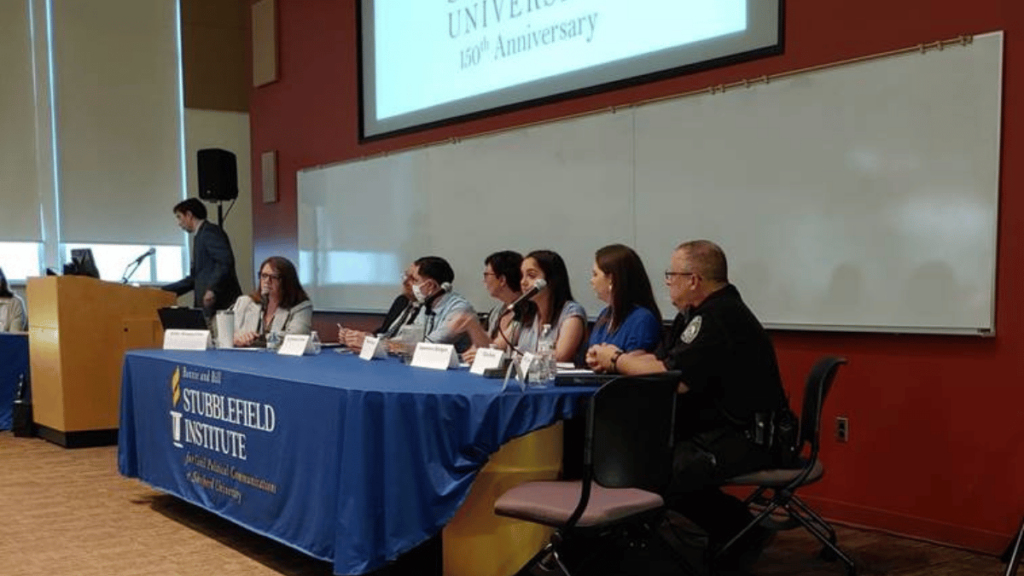Shepherd University in the Eastern Panhandle is encouraging conversations with its students and faculty on how to deal with a new state law allowing concealed weapons on campus.
Senate Bill 10, popularly known as the campus carry bill, takes effect July 1, 2024.
As part of the school’s preparations, a closed-door discussion was organized where the school’s community could discuss their thoughts or concerns.
The Stubblefield Institute, an organization that encourages political discussion on campus, helped organize a panel made up of faculty, students, campus police and other school officials.
Executive Director Ashley Horst said it’s a way to encourage open dialogue without debates turning into arguments.
“It’s intimidating to a lot of people who might have questions about the legislation or really about any controversial topic,” Horst said. “So our role at the Institute is to foster that conversation.”
The panel was organized in tandem with the creation of a campus task force. It’s meant to take in input from groups like these to help better prevent shootings from happening on campus.
“We knew that this was going to be a sensitive topic on campus,” Horst said. “And we knew that we could be of assistance in facilitating these conversations.”
Many of the panelists moderating the event are part of this task force. That includes Joshua Stout, assistant professor at the school’s department of sociology, criminology and criminal justice. He helped discuss some of the research on policies across the nation in states that had already enacted campus carry laws, and how that could inform campus decisions moving forward.
“We’re specifically looking at the ways that we can help to ensure that there isn’t an increase in violence on campus, or that there isn’t an increase in suicide or sexual assault,” Stout said.
Stout said the current research on these laws in states that have enacted them has shown neither an increase nor decrease in violent crime on campuses. But he also pointed out criminology research at large does point to an increase of violent crimes alongside more accessibility to firearms.
“It’s kind of that next logical step, right?” Stout said. “Even though there hasn’t been enough longitudinal data on college campuses, if we look at criminology and criminal justice research in general, it’s not hard to kind of make that connection.”
Fellow panelist and Director of Counseling Services Wendy Baracka is concerned about the law from a mental health perspective. An increase of firearms on campus could lead to more suicides among students struggling with mental health problems.
“Self-directed violence or suicide risk is something that is very prevalent on college campuses,” Baracka said. “And there’s a direct connection between access to lethal means and the potential for completed suicides.”
Others in attendance were concerned with the logistics of the new law. Money for new facilities to accommodate things like gun storage is an issue, but there’s also concerns about how safety guidelines would be implemented from students opposed to the new law, like Allison Sawicki.
“We were talking about where the guns are going to be stored,” Sawicki said. “If our roommates were gonna know [if a roommate was carrying], or do the police officers on campus have to know that that person is carrying?”
Other students in support of the law, like Genevieve Blodgett, are worried about separation in the dorms. One idea that was floated during talks was only allowing one residence hall to have firearm storage.
“We’re concerned that they might give us the worst dorm or that they may not give proper funding to put storage facilities everywhere, so that even though we’re allowed to carry, we’re unable to carry in all the buildings where people are populated,” Blodgett said.
Blodgett and Sawicki are roommates and friends with differing views on campus carry. Both of them are engaged in the process to make sure their peers can feel at ease.
“We want to make sure that everyone feels safe and comfortable with the bill,” Blodgett said. “Both sides, just making sure that everyone realizes what it entails and how to keep everyone safe while having some of these measures in place.”
There are plans to have further discussions about how the school will implement campus safety guidelines before the law goes into place. That includes a similar discussion when new students arrive in the fall. Stout is also planning on creating surveys and focus groups for his research on campus.
Until then, the campus carry task force at Shepherd University is looking at ways to build trust and community as preventative measures so potential incidents of gun violence won’t happen.
“We’re all going to have more of that social trust in one another,” Stout said. “But we’ll also have that social capital and resources that if something is of concern, we already have that established relationship and rapport, where we can talk with each other.”




















